Sami Zayn's Homecoming
On Montreal, Music, and Magic
Long ago, Montreal created El Generico from a song.
In a bar called Le Skratch, in 2002, a wrestling promoter was looking for someone to get tortured by TNT, the promotion’s resident sadistic heel. A red-headed kid hanging out in the back volunteered—he’d already wrestled two whole matches in other promotions and was ready to get his third in IWS.
(Here’s where I break my own precious rules and tell you simple and plain, here and now: this kid will one day be Sami Zayn. The only thing I cherish more than the illusion that Sami and El Generico are separate people is seeing Sami get the credit he deserve, so here he is, the hero of this story: Sami Zayn at awkward 18, child of many worlds, fully at home in none of them. Fully at home nowhere but in a wrestling ring).
The promoter balked at this brash volunteer. If the kid was going to stay in IWS, wouldn’t it ruin his career if everyone’s first impression of him was as a pathetic loser? In a flash of inspiration, he grabbed a luchador’s mask, put it on the kid, and sent him out to be stretched in safe anonymity.
The extremely generic luchador, introduced to the audience as “El Generico,” came to his doom. He was so thin you could see his ribs under the magic-marker “tattoos” scrawled on his skin. He leapt into the ring, his hands waving like strange migratory birds at the end of noodly arms, and cried out “OLÉ!”
A few people said “Olé?”
El Generico beamed at them and announced “OLÉ!”
A few more people called back “Olé!”
Filled with delight, El Generico sang out again “OLÉ!”
This time, a lot of people yelled back “OLÉ!”
At that moment, the impatient TNT struck at the hapless luchador, brutalizing him with submission after submission, twisting and torturing him until his heels drummed the mat and his hands clawed the air.
But then something magic happened. The audience’s hearts went out to this strange floppy masked stranger and they called out “OLÉ!” to him.
And El Generico heard them.
Years later, IWS publicist Michael “Llakor” Ryan gave El Generico a full backstory. He explained how Generico was originally a young luchador in Tijuana who tried to do an illegal brainbuster because, as Llakor puts it, “he knew that mastering these moves would make him cool. And at that age, being cool seemed more important than life itself.” Banned from Mexico, he fled north in disgrace until he made his way to Montreal and volunteered for that fateful match with TNT.
Llakor’s description of that first match, the one that created El Generico, is fascinating because he argues that Generico wasn’t calling out for support as TNT bent and contorted him. No, Generico was crying out “OLÉ” simply because he was lost, confused, suffering, and couldn’t remember how to say anything except “olé.” He wasn’t reaching out to the audience, but their voices reached him anyway.
Wrestling TNT was like wrestling an octopus with a PHD in causing pain. TNT twisted him like a human pretzel; stretching muscles; popping ligaments; grinding cartilage; all the time screaming in El Generico’s ear for him to give up. El Generico wanted to, but in the pain and confusion he lost what little English that he had and could no longer remember how to submit. He knew that he could tap the mat to end the match, but found that his pride was making it impossible to do that. But he had to say or do something. He found himself screaming, “OLE!” A second later the crowd roared back, “OLE!”
He heard them, and their voices gave him strength to endure the suffering, to resist TNT’s viciousness, and they saw him hear them, and that gave them strength to keep calling out. Together they created a circuit of song and strength, until finally TNT gave up in disgust, beating Generico senseless with a chair and walking away, letting the referee count him out. El Generico emerged bruised and battered, but the winner. Of the match, technically yes, but also of something far more important: the hearts of the IWS fans. From then on in, the weird red-headed kid was El Generico, beloved son of Montreal.
The skill of wrestling is about moves and holds. The goal of wrestling is about pinfalls and victories. But the magic of wrestling is about listening. In the middle of a match, wrestlers can rarely take the time to see the audience, but they hear the chants, the cheers, the boos. They calibrate the match based on what they hear, like conductors with a symphony. Like band leaders with a band. A wrestling crowd is not merely an audience. They’re part of the performance. They’re making music with the wrestlers.
Sami Zayn in NXT brings all the skills and all the magic of El Generico and gives them a human face, and the Full Sail crowd responds with all their hearts. When Sami has the opportunity to beat Neville and win the NXT championship through underhanded means, by striking Neville with the belt, the audience rises up almost as one to chant with all their heart: “No! No! No!” Desperate to make Sami hear them, to let him know that they love him as he is.
And Sami hears them. He hears the audience’s love and it carries him through to victory without sacrificing his self. This moment is when Sami becomes my favorite wrestler. The idea that your voice could make a difference, that it could be heard by a fictional character, a hero like Sami or a villain like Kevin—it’s enchanting to me. And no one heard the audience better than Sami Zayn.
For a while.
When El Generico went to PWG in Los Angeles to wrestle for the first time, Llakor described him as “a nervous wreck”—he claimed because Generico was nervous about “returning home”:
“Thomas Wolfe said, ‘You can’t go home again.’ To be sure, Los Angeles was not Tijuana, it was not even Mexico, but for the home-sick El Generico it seemed the closest that he would ever be allowed to come. Los Angeles might not be in Mexico, but in all other respects it was a Mexican city. The traditions of lucha libre were honoured and respected there. El Generico wondered how he would be received. How would a crowd of Los Angelinos react to a man who had been banned from Mexico, who had violated the cardinal rules of lucha libre?”
I absolutely believe Generico was indeed nervous, but not because this was a homecoming. No, I take Llakor to be saying elliptically that the Canadian kid behind the mask may have been sick with worry that a Los Angeles crowd would take El Generico as a racist mockery. But his fears were unfounded.
“He came out to Bouncing Soul’s ‘OLE!’ just like in Montreal, and when the music ended just like in Montreal, he yelled ‘OLE!’ The crowd roared back, ‘OLE!’”
So El Generico (and with him, Sami) came to America on the long path that took him to Ring of Honor, took him around the world, took him to WWE.
The path that takes him, on Feb. 18, 2023, back home to Montreal.
When Sami Zayn comes up to the main roster, I worry that he won’t be able to channel a huge arena’s energy the way he could an Amvets hall or Full Sail. I needn’t have worried; he seems to be doing well. He loses a lot—but then, El Generico and Sami Zayn always lose a lot. The crowds still love him. He still hears them.
There’s a beautiful moment in London in 2016 where he comes to the ring and the audience starts singing “Worlds Apart,” his theme song. When the music stops, the audience keeps singing, carried forward by their joy and affection, and Sami stops dead on the ramp to pause and listen (it’s Kevin that he’s smiling at, waiting for him in the ring).
“Worlds Apart” is perfect for Sami at that time, from the yelled “Let’s go!” that invites everyone to join in, to the soaring chorus that manages to faintly echo the “olé” chant that still follows him around.
The energy between Sami and the audiences—in London, in America, all over the world—is so strong that it seems almost palpable, like you could reach out and dabble your hands in it as it rushed by. When Sami appears on UpUpDownDown, he’s told he has to have a nickname; casting his eyes around he spots a discarded battery and decides to call himself Battery Man. It’s a whimsical, nonsensical choice, but it’s also perfect, because that’s exactly what he is: a battery that stores energy from the audience and converts it into power and story.
I want so much to believe that the audience’s love will sustain him through the hard times, that he’ll never lose the ability to hear how much we love him, that the magical circuit will always stay open, crackling and humming with energy and song.
It doesn’t.
When Sami turns heel in 2017 to ally with Kevin, he rants about how the audience’s support had become a burden to him.
“And I carried them on a long journey that brought me all the way to…mediocrity,” he concludes bitterly, pointing out that the audience’s love was supposed to get him titles and glory, and we had failed him.
“They didn’t uphold their part of the unspoken contract,” he snarls beneath his brittle smile, gesturing wildly at the stricken audience, “where I work hard and in return they cheer for me so hard and so loud that they make me undeniable to management.”
He’s so certain of himself that I fully accept that this is the truth, and it breaks my heart. We had failed him! All of our singing and chanting and love had only weighed him down, it had never rewarded him in any way. Now, looking back six years later, I suspect that maybe miserable new-heel Sami isn’t exactly supposed to be a reliable narrator. Is it his feeling that he has failed us that broke him? That we had invested so much time and energy in him and he hadn’t paid it back in gold? Or was it our strident demands for him to win a title that caused him to despair? Whatever the reason, he’s found a simple solution, and that is not to care about us anymore.
He won’t be listening to us anymore, he won't hear us. He’s slammed the door between him and the audience shut, insulated it against our voices. I know this, and it turns my own heart barren as shattered glass. He’s given up on us.
“He’ll turn face again soon,” my husband reassures me. “There’s no way he’ll be a heel for long.”
“I can’t bear it,” I mutter. Even his alliance with Kevin can bring me no joy; he’s closed-off, brittle, hollow. He doesn’t care about anything, not even Kevin, really.
“It won’t be for long,” my husband says.
He and Kevin are uneasy allies for nine months, and then Sami has double shoulder surgery (he carried our hopes and our dreams on them, too heavy for any mortal shoulders) and is gone for almost a year.
Sami comes back from his surgery in April 2019, after WrestleMania. He comes to the ring and the crowd sings “Worlds Apart” to him in joyous welcome, but all the hope in my heart fades to dust at his expression.
He’s still not listening. The sound of his music is hitting his ears, but not his heart. In the next few weeks, in a series of scathing promos, he rants at the audience and their greed and their demands, saying explicitly that he’ll no longer be receiving energy from them.
His hands push the audience’s love away, putting them–their demands and their hopes and their dreams–in their place.
Unfortunately for Sami, that’s not the way it works in wrestling. He’s cut himself off from the music of the audience like a man dying of thirst hurling water to the ground and calling it poison. I suffer for him, watching him.
“He’ll turn face soon,” my husband reassures me. “His faith in himself is shattered. There’ll be a story soon about how he gets it back, and the audience will be part of it. Look,” he reasons with me, “As long as he’s still got Worlds Apart as his theme song, it’s obvious we’re supposed to keep singing for him.”
One of the promos is delivered in Montreal, which is the cruelest of all. He sneers at the fans singing with all their hearts, battering at his walls with music. He jumps to his feet with a cynical grin, a puppetmaster pulling heartstrings to make people dance for him.
He yells “OLÉ!” and Montreal, desperate to prove they still love him, that they can somehow get through to him and make him hear them, roars “OLÉ” back to him loud enough to shake the roof, but he’s untouched, miserably aloof.
“I’ll see you in hell,” he snaps, stalking off, and I know that this is hell, and we are indeed seeing him in it. He’s become Tantalus, standing forever in a pool of refreshing water, always surrounded by what he yearns for, always unable to reach it.
“Maybe Thomas Wolfe was wrong,” said Llakor in 2007, writing about that first trip to Los Angeles. “Maybe you could go home again. Or maybe what he meant was that the person that you were when you left was not the same person that you were when you came back.”
Maybe the person you are when you left is not the same person as you were when you came back.
It gets worse. Little by little, Sami gives up move after beautiful move he used to do, as if he can’t forgive them for failing him, or himself for having failed them. By the summer of 2019 he’s given up wrestling altogether and has turned manager for Shinsuke and Cesaro, helping them but not entering the ring himself.
Strangely, this doesn’t bother me as much as other heelish things, because I know it must be temporary and must be part of a story. It must be! No way would Sami Zayn help someone else win the Intercontinental title if he weren’t going to win it himself sometime soon. He’s going to get his moves back, I know it. He’s going to start really wrestling again. And when he does, his allies are going to turn on him. Shinsuke and Cesaro will cast him out and then he’ll be able to connect with the audience once more, and they’ll give him the strength to stand up for himself and win the Intercontinental title on his own terms. They’ll carry him to something more than mediocrity at last.
Yes, I tell myself, next year surely this will all come true.
2020 will be the year that Sami hears the audience again.
When I see the dazzling collage of screens of the Thunderdome, I put my face in my hands and I sob. It’s brilliant, dazzling, a defiant technological fuck-you to the pandemic. And there’s no audience sound at all, just images on screens and a piped-in buzzing hum that can be made to rise and fall, but never respond organically to events. Sami will never hear his name chanted here. He’ll never pause on the stairs to listen to the crowd. He’ll never gain strength from their voices. The moment is lost, the story moves on, and I start to resign myself to the fact that Sami might remain a heel forever and I might never again see his face light up as the audience pours its love toward him like a mighty river.
Despite my despair, Sami actually thrives in the Thunderdome. Maybe it’s a relief that there’s no audience, that he doesn’t have to curb his instinct to channel the crowd’s energy into joy. Maybe Tantalus would feel relieved to have his pool drained for a while, to be able to stand on dry and barren land. Sami’s character work flourishes. His unhinged conspiracy theories become more and more hilarious.
He starts to dance again.
It’s a mocking dance, a heelish dance, but it’s a dance, and you can’t dance without hearing music somewhere in your heart. It’s a small step, but I celebrate it.
As the Thunderdome Era comes to an end and we start to have live audiences again, Sami’s entrance music changes: the beginning is the same, but just at the point it used to pick up into song, now it slows down into a sludge of fuzzy electric guitar chords that no one could possibly sing along to. It’s not even really a new song, it keeps just enough of the beginning to be tantalizing before grinding down into cacophony. I remember my husband reassuring me that as long as he has “Worlds Apart” we’re meant to sing for him, and I officially give up: he’s been a heel most of his WWE career now, and he’ll probably be a heel when he retires. I tell myself I don’t care anymore. He’s great no matter what he does. It’s fine. I don’t care. I don’t care. I don’t care.
I mute the first ten seconds of his entrance every time, unable to bear it.
Coming off his humiliating loss to Johnny Knoxville at WrestleMania in 2022, Sami decides he has to gain back the respect of the locker room, and he’ll do that by winning Roman Reigns’ respect and joining his faction, the Bloodline. At first his attempts to win over the Samoans are merely hilarious. Obviously he’s never going to fit in. But little by little, he makes headway. Jimmy and then Jey start to like him and even respect him. Okay, Sami has to lose more and more of himself to do it, but so what? Like El Generico so long ago, doing banned moves to show off, he craves that affirmation from the cool kids.
Way back in 2007, Llakor said that El Generico never watched Christmas specials growing up, but his IWS friends showed him Rudolph the Red-Nosed Reindeer and he identified with the title character, always out of sync with the other reindeer, rejected for being too odd, for shining too bright. The moment when the Los Angeles audience loves him, Llakor said, is like the moment when Santa and the reindeer suddenly realize how valuable Rudolph’s gifts actually are.
At that moment, Rudolph realizes that his curse is really a blessing; that what made the other reindeer drive him into exile is what will now save the day; that what made him a freak is what makes him a hero.
El Generico had his Rudolph moment. He realized that his journey was complete; that he was accepted; that he was cool; that he was home.
Reading his words for the first time in February, I choke on sudden startled laughter when I remember that Sami was Rudolph in the most recent WWE Christmas special.
The misfit hero comes home to the love he always deserved, his journey complete; what’s not to love about that story?
As Sami tries to be one of the cool kids, a slow transformation happens. He goes from being pathetically funny to sympathetic. The audience starts to root for him to win the Bloodline over. When Jey hugs him at the end of Survivor Series, the crowd roars its approval. Sami can’t help but hear them, but he very deliberately doesn’t listen to them; he’s too busy trying to convince himself that the respect of the Bloodline is the affirmation that he craves. Still, it’s getting harder to maintain that aloofness. He starts being uncomfortably sheepish that they’re chanting for him, aware that the Tribal Chief doesn’t like the spotlight shifting away from him.
Little by little, the crowd is wearing down his defenses. I cheer for them every time they manage to make him almost smile. He can’t ignore them forever, I know it.
At the Royal Rumble, Kevin even points out to Roman that no one cares about him; they’re chanting for Sami, as Sami stands at ringside in an agony of mixed apprehension and joy.
In a way, Kevin, that genre-savvy Everyman, is a stand-in for the audience here, translating their siren call into words for Roman—and for Sami, there on the sidelines, trying not to hear it. When he reaches out for Sami, when Sami begs him to give up, to stay down, Kevin is all of us, refusing to let Sami shake us off. Kevin suffers and suffers until Sami can no longer ignore his friend, his enemy, his rival, his brother, his fellow Quebecois, the man who drove with him to bars and Knights of Columbus halls through the dark Montreal nights when they were young men with nothing but dreams and goals.
There’s a small, beautiful moment in the middle of the whole climactic showdown: when Roman turns his back on Sami, Sami lifts the chair for just a second, and the crowd noise lifts with him in anticipation, then dies down when he lowers it, as if he were a conductor lifting his baton to cue the orchestra to begin a symphony.
When the chairshot finally happens, the audience erupts like a fanfare. They’re playing his song again. The band is back together, they’re just waiting for the lead singer to realize it and join in once more.
In 2007, Llakor was writing to send El Generico off to Europe, where he was going to wrestle in the King of Europe Cup in England and wXw’s !6 Karat Gold tournament in Germany. His recap of Generico’s birth and life and “Rudolph moment” was to make clear who Generico was and what he stood for, to reassure him that wherever he went in the world, he would always have the crowd in the palm of his hand. He finished his piece with these words:
So, if it comes to pass that El Generico finds himself in danger of losing, I know what will happen. He will yell, “OLE!” and the crowd will roar back, “OLE!” and everything will be all right.
Once you are at home in your own skin, you can never be lost again.
At Elimination Chamber in Montreal, Roman Reigns is going to do his best to break Sami in front of the people who love him.
Just this week, Cody Rhodes reminded Sami of what he may have forgotten. He asked Sami: You don’t know if you can win? “It seems like your hometown of Montreal, where they watched you as an upstart wrestler and they’re gonna be chanting your name—it seems like they know.”
I doubt that Sami will yell “OLÉ!” in Montreal in his moment of need, but the crowd will be roaring it back to him anyway, and everything will be all right.
Because maybe this is it, maybe this is the moment the fans finally fulfill that unspoken contract that Sami mentioned with such bitterness years ago, the one where the fans cheer so loud and so hard that they make him undeniable at last. Maybe in Montreal the fans finally redeem themselves and repay his efforts by getting him the gold that he deserves. “Finish your story, Sami!” Cody begged him. To be carried to victory in his hometown, lifted up by the voices of those who love him best–surely this is the story ending Sami deserves, right?
Well. Hear me out.
Maybe there’s a deeper and wilder magic in wrestling, something beyond the transactional hocus-pocus where we cash in the correct amount of cheers for a certain weight of leather and metal. Maybe Montreal can sing Sami Zayn to a greater prize than what Roman Reigns carries on his shoulders, a reward that the Tribal Chief can never possess, never even comprehend. Maybe, after all, the story that Sami Zayn needs to finish is not about championships.
I don’t know who will win at Elimination Chamber. But I do know that on that day, Montreal will sing to Sami Zayn as it once sang to El Generico, a song that says Welcome back, beloved misfit, our son, our brother, whom we love exactly as you are. If he will only follow the sound of their voices raised in song, they will guide him home. For the true prize, the one that Roman Reigns can never grasp, is Sami Zayn’s self, in all its awkward, odd, bright-shining glory.
Long ago, Montreal created El Generico from a song. At Elimination Chamber, Montreal will have a chance to re-create Sami Zayn with music, with magic, with love, by reminding him of the words Llakor once said to El Generico.
Once you are at home in your own skin, you can never be lost again.


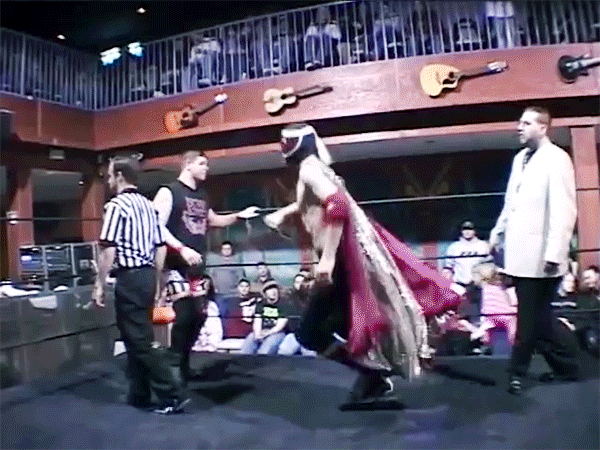
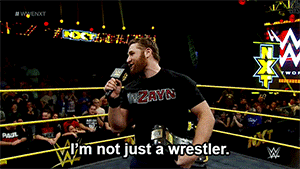




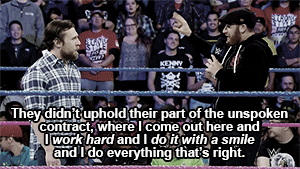

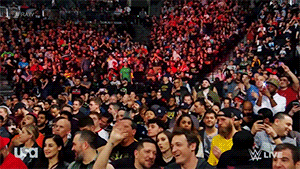



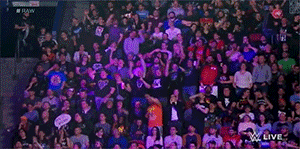



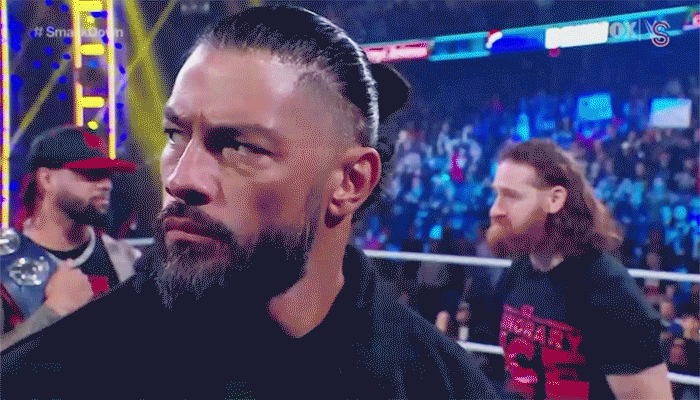
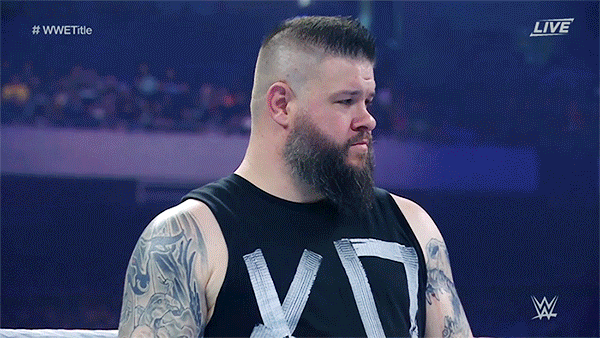



Goddammit, JJ, you made me cry again!
Roman will likely win. Sami is right--he knows the Bloodline machine doesn't allow the Tribal Chief to lose.
But Roman cannot, will not break Sami. Sami will hear his home cheering for him, and he will not only hear them, he will listen.
There's another scenario I've considered, though.
What if Sami wins? What if they really pull the trigger and make the crowd happy? They could do it. They could even piece together an ending where Jey stops Jimmy and Solo from interfering. And then, in an incredibly satisfying moment, KO shows up and stuns Heyman into oblivion.
Now, this is different than saying Sami is the new face of the company or that he headlines Wrestlemania. This just isn't going to happen.
But.
What if, on Monday night, a desperate but still powerful Roman tells both Jimmy and Jey that they're out of the Bloodline. They are no longer relevant. They will be defending their tag titles, if he allows them, at house shows or on Main Event. Their families are cut off. He loved them, and he warned them that if they didn't acknowledge him, they'd be cut off. When Jimmy protests, Roman cuts him off and says it was his duty to turn his brother around, and he failed.
Unless.
Roman has demanded a rematch on RAW, that very night, and he's used his pull to get every stipulation he wants. KO banned from ringside or it's a DQ. He says if they acknowledge him again and help him win back the title and then punish Sami, he will take them back. After all, he loves them.
It's a hell of a match. The ref goes down. Sami gets low-blowed and Roman feeds him to his cousins. CODY arrives to even the odds and takes out Solo and is fighting Jimmy. It's just Jey and Sami, and a weeping Jey hits Sami with the belt. Roman wins the title. They start beating down Sami. KO shows up to save Sami, and they manage to clear the ring. That's when Sami and KO officially reunite and declare wanting the belts at Mania.
I doubt that will happen, but I'd so love to see that moment where Sami truly comes home again, comfortable in his own skin at last.